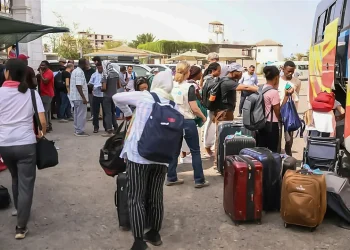By John Ikani
Ten individuals who participated in last month’s widespread protests in Nigeria are now facing grave charges, including treason, at a federal court in Abuja. Each of them has entered a plea of not guilty.
The demonstrations, known as the “10 days of rage,” were a direct response to the severe economic hardship many Nigerians are currently enduring.
The protests turned violent in certain areas, leading to clashes between demonstrators and security forces. Police reports indicate at least seven fatalities, while human rights organizations claim the death toll is as high as 23. Additionally, nearly 700 arrests were made.
In addition to the treason charge, the ten individuals appearing in court on Monday face accusations of damaging public property and harming police officers.
The charge sheet alleges they collaborated with a British citizen “to destabilize Nigeria by urging the military to overthrow President Bola Ahmed Tinubu’s government.” They reportedly chanted slogans like “Tinubu must go, it is soldiers we want.”
Despite a plea for bail, citing their month-long detention, the court ruled that the accused individuals remain in custody. Amnesty International, a prominent human rights organization, has condemned the legal proceedings, labeling the trial a “sham” and previously demanding investigations into the protest-related deaths.
These demonstrations erupted in major Nigerian cities on August 1st, with participants voicing their grievances through chants such as “we are hungry” and “end bad governance.” Organized via social media, the protests were partly motivated by the success of Kenyan demonstrators who successfully pressured their government to abandon tax hike plans.
In certain regions, curfews were enforced as authorities claimed the protests had been “hijacked by thugs” engaging in looting and property destruction.
Nigeria is currently grappling with its most severe economic crisis in decades. Annual inflation has surged past 30%, with food prices experiencing even steeper increases.
In the bustling commercial center of Lagos, for instance, yams, a staple food, are now nearly four times more expensive than they were last year.




































